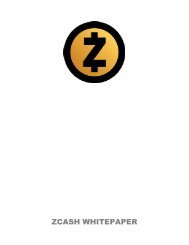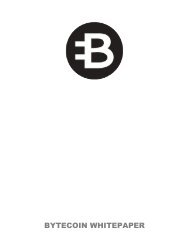Whitepaper - Ethereum Classic With Cover
You also want an ePaper? Increase the reach of your titles
YUMPU automatically turns print PDFs into web optimized ePapers that Google loves.
<strong>Ethereum</strong> <strong>Classic</strong> Documentation, Release 0.1<br />
• Mining profitability calculator on cryptowizzard<br />
• Mining profitability calculator on etherscan<br />
• Mining profitability calculator on In The Ether<br />
• Mining difficulty chart on etherscan<br />
POS vs POW<br />
• https://www.reddit.com/r/ethereum/comments/38db1z/eli5_the_difference_between_pos_and_pow/<br />
• https://blog.ethereum.org/2014/11/25/proof-stake-learned-love-weak-subjectivity/<br />
• https://www.reddit.com/r/ethereum/comments/42o8oy/can_someone_explain_the_switch_to_pos_how_and_when/<br />
1.7 Contracts and Transactions<br />
1.7.1 Account Types, Gas, and Transactions<br />
EOA vs contract accounts<br />
There are two types of accounts in <strong>Ethereum</strong><br />
• Externally Owned Accounts<br />
• Contracts Accounts<br />
This distinction might be eliminated in Serenity.<br />
Externally owned accounts (EOAs)<br />
An externally controlled account<br />
• has an Ether balance,<br />
• can send transactions (ether transfer or trigger contract code),<br />
• is controlled by private keys,<br />
• has no associated code.<br />
Contract accounts<br />
A contract<br />
• has an Ether balance,<br />
• has associated code,<br />
• code execution is triggered by transactions or messages (calls) received from other contracts.<br />
• when executed - perform operations of arbitrary complexity (Turing completeness) - manipulate its own<br />
persistent storage, i.e., can have its own permanent state - can call other contracts<br />
All action on the <strong>Ethereum</strong> block chain is set in motion by transactions fired from externally owned accounts.<br />
Every time a contract account receives a transaction, its code is executed as instructed by the input parameters<br />
sent as part of the transaction. The contract code is executed by the <strong>Ethereum</strong> Virtual Machine on each node<br />
participating in the network as part of their verification of new blocks.<br />
This execution needs to be completely deterministic, its only context is the position of the block on the blockchain<br />
and all data available. The blocks on the blockchain represent units of time, the blockchain itself is a temporal<br />
1.7. Contracts and Transactions 73
















